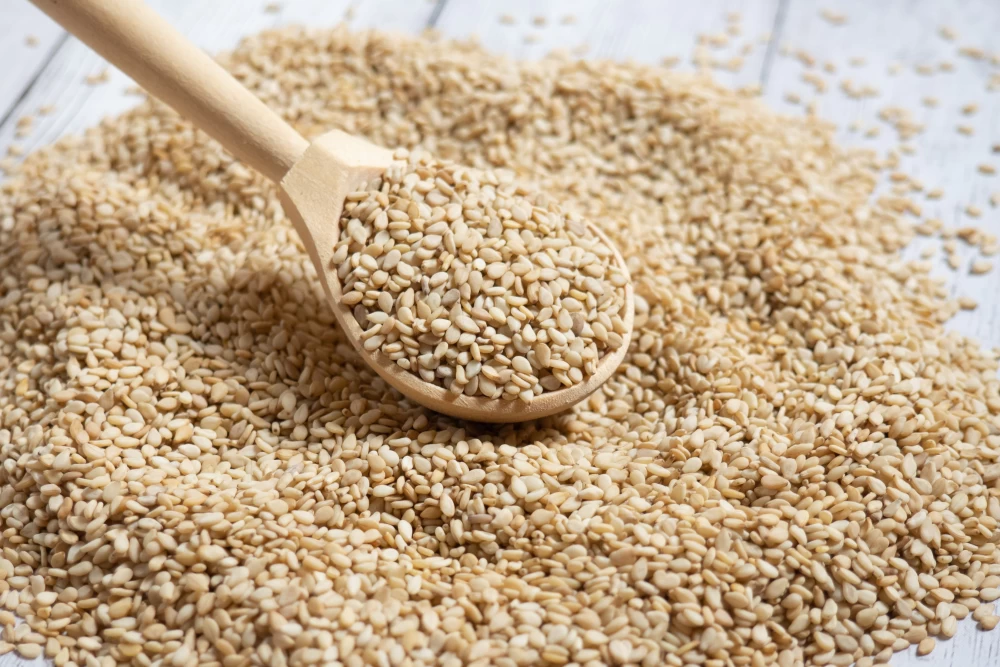
- 29th November 2023
Table of Contents
- 1. Rich in Nutrients:
- 2. Boosts Immune System:
- 3. Enhances Bone Health:
- 4. Natural Source of Protein:
- 5. Keeps Skin Moisturized:
- 6. Regulates Blood Pressure:
- 7. Manages Stress and Anxiety:
- 8. Supports Digestive Health:
- 9. Balances Hormones:
- 10. Rich in Healthy Fats:
- 11. Provides Energy Boost:
- 12. Versatile Culinary Addition:
As the winter chill sets in, our dietary choices play a crucial role in fortifying our bodies against seasonal challenges. Amidst the myriad of options, white sesame seeds emerge as unsung heroes, offering a spectrum of health benefits that make them a valuable addition to your winter diet. In this blog, we will delve into 12 compelling reasons why incorporating white sesame seeds into your meals can contribute to your overall well-being during the winter months.
1. Rich in Nutrients:
White sesame seeds are a nutritional powerhouse, packed with essential vitamins and minerals. They are a notable source of calcium, iron, magnesium, phosphorus, and zinc, providing a well-rounded nutritional profile crucial for maintaining overall health. Nutritional facts of unhulled white sesame seeds per tablespoon:
2. Boosts Immune System:
The winter season often brings an increased susceptibility to colds and infections. White sesame seeds contain zinc, a mineral known for its immune-boosting properties. Regular consumption can help fortify your body's defenses against common winter illnesses.
Zinc, selenium, copper, iron, vitamin B6, and vitamin E are just a few of the immune system-supporting nutrients found in abundance in sesame seeds. To build and activate specific white blood cells that detect and destroy invading microbes, your body requires zinc, for instance.
Remember that any zinc deficiency, no matter how slight, can hinder the immune system's ability to do its job. Three tablespoons (30 grams) of sesame seeds provide around 20% of the recommended daily intake (RDI) for zinc.
3. Enhances Bone Health:
Calcium and phosphorus found in white sesame seeds contribute to bone health, vital during the winter when outdoor activities might be limited. Including sesame seeds in your diet supports bone strength and helps prevent conditions like osteoporosis.
30 grams of unhulled white sesame seeds contains 22% of the RDI for calcium, 25% of the RDI for magnesium, 32% of the RDI for manganese, and 21% of the RDI for zinc.
The antinutrients oxalates and phytates found in sesame seeds, on the other hand, hinder the body's ability to absorb these minerals. If you want to reduce the effect of these chemicals, you can soak, roast, or sprout the seeds first.
4. Natural Source of Protein:
Amidst the winter cravings for comfort foods, incorporating white sesame seeds provides a protein boost. Proteins are essential for muscle repair, immune function, and overall energy during the colder months.
Choose roasted sesame seeds that have been hulled to make the most protein available. Roasting and hulling remove phytates and oxalates, two substances that impede protein digestion and absorption.
Lysine is an important amino acid that is more commonly found in animal products; sesame seeds have low levels of this amino acid. Vegetarians and vegans can make up for it by eating legumes like chickpeas and kidney beans, which are rich in lysine.
Sesame seeds, on the other hand, are a good source of the amino acids cysteine and methionine, which are low in legumes.
5. Keeps Skin Moisturized:
Winter weather can be harsh on the skin, leading to dryness and irritation. The high zinc content in sesame seeds promotes collagen production, helping to keep the skin supple and moisturized, combating the effects of winter dryness.
6. Regulates Blood Pressure:

Magnesium, a key component of white sesame seeds, plays a role in blood pressure regulation. Including sesame seeds in your winter diet can contribute to maintaining healthy blood pressure levels, supporting cardiovascular health.
The danger of cardiovascular disease and stroke is greatly increased in people with hypertension.The magnesium content of sesame seeds suggests they could have a hypotensive effect.
Sesame seeds include antioxidants like vitamin E and lignans, which may aid in artery plaque prevention and, by extension, healthy blood pressure.
7. Manages Stress and Anxiety:
The winter season can sometimes bring about feelings of stress and anxiety. Sesame seeds contain B vitamins, including B6 and folic acid, which are known to support the nervous system and help manage stress levels.
8. Supports Digestive Health:
Winter indulgences can sometimes disrupt digestive balance. Sesame seeds are a good source of dietary fiber, aiding in digestion and preventing constipation. This is particularly beneficial when dietary habits may vary during the colder months.
9. Balances Hormones:
The lignans in white sesame seeds have been associated with hormonal balance. For women experiencing hormonal fluctuations during winter, incorporating sesame seeds may offer a natural way to support hormonal health.
With 18% of the RDI in both hulled and unhulled seeds, sesame seeds are a fantastic selenium source. Of all the organs in your body, the thyroid gland has the highest concentration of selenium. Thyroid hormone production relies on this mineral.
In addition to helping with thyroid hormone production and overall health, the iron, copper, zinc, and vitamin B6 found in sesame seeds are great for your thyroid.
10. Rich in Healthy Fats:
Sesame seeds are a source of healthy fats, including monounsaturated and polyunsaturated fats. These fats are essential for nutrient absorption, especially fat-soluble vitamins, and contribute to overall heart health.
There is a mix of saturated (15%), polyunsaturated (41%), and monounsaturated (39%), fat in sesame seeds. In order to lower cholesterol and lower the risk of heart disease, research suggests that eating more monounsaturated and polyunsaturated fats instead of saturated fats may be beneficial.
Sesame seeds may also help reduce cholesterol levels because they include phytosterols and lignans, two classes of plant compounds.
11. Provides Energy Boost:
Winter lethargy can sometimes be a challenge. Sesame seeds are a concentrated source of energy, offering a quick and nutritious pick-me-up, making them an ideal snack to combat winter fatigue.
12. Versatile Culinary Addition:
One of the most practical reasons to include white sesame seeds in your winter diet is their versatility. Sprinkle them on salads, incorporate them into stir-fries, or use them as a topping for various dishes. Their mild, nutty flavor complements a wide range of foods, making it easy to enjoy their health benefits in diverse ways.
As winter unfolds its chilly embrace, the inclusion of white sesame seeds in your diet becomes not just a culinary choice but a strategic step toward holistic well-being. From immune support to bone health, stress management, and beyond, the nutritional prowess of white sesame seeds positions them as a winter superfood deserving of a prominent place in your daily meals. So, embrace the goodness of these tiny seeds and let their health benefits pave the way for a nourished and resilient winter season.














